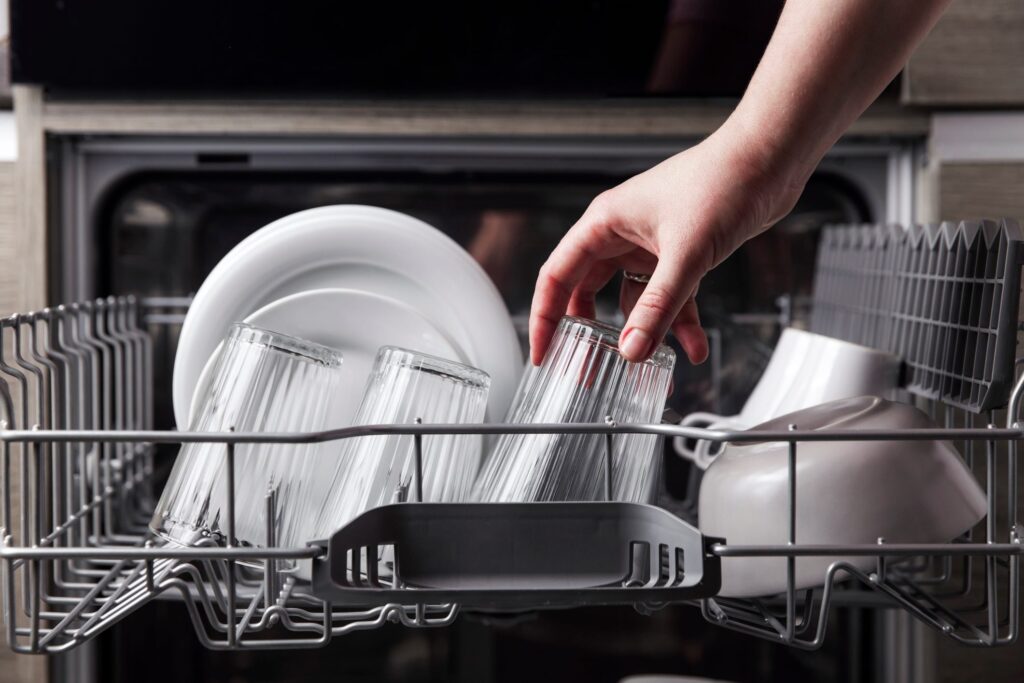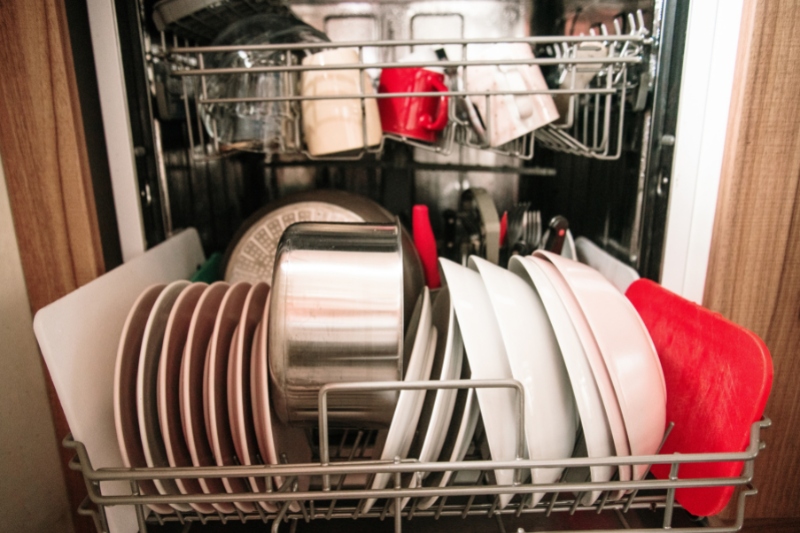Imagine It’s a busy Monday evening, and after a big family dinner, there’s a mountain of dirty dishes waiting to be cleaned. You load them into the dishwasher, but then a question pops into your head: “How long can dishes sit in the dishwasher before it’s a problem?” It’s a common question we all have at times.
It’s usually best to run the dishwasher within 24 hours of filling it with dirty dishes to avoid bacteria and mold growth.
If necessary, dirty dishes can wait in the dishwasher for up to a day before washing, but it’s a good idea to rinse off excess food to prevent it from getting stuck.
Clean dishes can stay in the dishwasher for up to 4 days, but it’s better to unload them sooner to avoid water spots and bacteria buildup.
Is It OK to Leave Dishes in The Dishwasher Overnight?

Yes, It’s okay to leave dishes in the dishwasher overnight. Leaving your dishes in the dishwasher overnight is a convenient and generally safe practice, suitable for anyone looking to streamline their daily routine.
Modern dishwashers are designed to maintain a hygienic environment, with high-temperature water and specialized detergents that effectively remove food particles, grease, and bacteria.
To make the most of overnight storage, simply scrape off any leftover food from your dishes before loading them into the dishwasher. This basic step prevents food from hardening onto your dishes and ensures a more efficient cleaning process.
Many dishwashers come with a “delay start” feature, allowing you to schedule the wash cycle to begin at a convenient time, like early in the morning.
This not only guarantees that your dishes are fresh and ready to use when you need them but also minimizes any potential noise disturbance during the evening.
Additionally, if you run your dishwasher during off-peak hours, it can be an environmentally friendly choice that saves both water and energy. Regular dishwasher maintenance, including cleaning the appliance and checking for blockages, is vital for consistent performance.
In sum, leaving dishes overnight in the dishwasher can simplify your daily life and ensure that your dishes are clean and ready to go, provided you follow these straightforward practices to keep things running smoothly.
Is It OK To Leave Dirty Dishes In The Dishwasher For a Week?
No, It’s not recommended to leave dirty dishes in the dishwasher for a week due to potential hygiene and cleanliness issues.
While modern dishwashers are designed to store dishes in a clean and controlled environment, extended periods can lead to problems.
Over time, food particles left on dishes can harden, making them more challenging to clean during the wash cycle.
Moreover, the warm, humid conditions inside the dishwasher create an ideal breeding ground for bacteria and mold. This can result in unpleasant odors, compromised hygiene, and even staining on dishes.
To maintain a healthy and efficient dishwasher, it’s advisable to avoid leaving dirty dishes for extended periods. If you anticipate a delay in running the dishwasher, consider rinsing dishes before placing them inside or using a rinse-and-hold feature if your dishwasher has one.
Regularly emptying and running the dishwasher every few days, even with partial loads, can help prevent these issues and ensure consistently clean and odor-free dishes.
How Often Should You Run a Dishwasher?
Determining how often to run your dishwasher depends on several factors, including your household’s size, cooking habits, and the dishwasher’s capacity and energy efficiency.
On average, many households run their dishwasher once a day, typically in the evening after dinner when the day’s dishes have accumulated. This daily schedule helps maintain a clean and organized kitchen while also ensuring that dishes are readily available for the next meal.
For smaller households or those with lighter dishwashing needs, running the dishwasher every other day or even every few days may suffice.
On the other hand, larger families or those who frequently entertain guests may need to run the dishwasher more frequently, possibly multiple times a day. Energy-efficient dishwashers with larger capacities allow for less frequent use, helping to save water and energy.
It’s important to load the dishwasher efficiently, maximizing its capacity without overcrowding or blocking the spray arms.
Furthermore, consider the use of the dishwasher’s energy-saving features and choose the appropriate wash cycle based on the level of soiling on your dishes.
Ultimately, the frequency of dishwasher use should align with your specific needs and the dishwasher’s capabilities, while also taking energy and water conservation into account.
What is the best time to use a dishwasher?
The best time to use a dishwasher can vary depending on your lifestyle, schedule, and energy-saving goals. However, there are a few key considerations that can help you determine the optimal time to run your dishwasher.
To reduce energy costs and potentially lower your utility bills, consider running your dishwasher during off-peak hours. Off-peak hours are usually in the early morning or late evening when electricity demand is lower. Check with your utility provider to find out their specific off-peak timeframes.
Also, many people find it convenient to run the dishwasher in the evening after dinner. This allows you to load it throughout the day and have clean dishes ready for the next morning.
However, if noise is a concern in the evening, consider using the dishwasher’s delay start feature to begin the cycle during quieter hours.
Besides, dishwashers often have energy-saving settings or eco-friendly modes. These settings use less water and energy, making them an excellent choice for any time of day.
Energy-saving settings on dishwashers can reduce your energy bill by 10% to 20% since they use less water and energy to clean dishes.
As an example, a regular dishwasher cycle typically consumes around 20 gallons of water, while an energy-saving cycle may use as little as 10 gallons. This translates to significant water savings over the course of a year.
For instance, Energy Star-certified dishwashers, according to an Energy Star study, use less than half the energy and water of regular models. These certified dishwashers adhere to strict energy efficiency standards set by the U.S. Environmental Protection Agency (EPA).
So, If you’re concerned about energy consumption, these settings can help reduce your dishwasher’s environmental impact.
Additionally, try to maximize your dishwasher’s capacity without overcrowding or blocking the spray arms. This not only ensures efficient cleaning but also reduces the frequency of use.
Your daily routine and meal schedule may influence when you run the dishwasher. Some prefer to run it after each meal, while others wait until the end of the day. Tailor your dishwasher use to fit your lifestyle and minimize disruptions.
In conclusion, the best time to use a dishwasher depends on your individual needs and priorities.
Whether it’s during off-peak hours to save on energy costs, in the evening for convenience, or using energy-efficient settings, you can choose a time that aligns with your schedule and environmental goals.
Ultimately, optimizing your dishwasher usage can lead to cleaner dishes, energy savings, and a more efficient kitchen routine.
What can help a dishwasher to clean the dishes at its best?
To achieve top-notch cleaning performance with your dishwasher, a series of essential steps should be followed.
Properly loading your dishwasher is fundamental; arrange dishes in a way that allows water to reach all surfaces without overcrowding.
Before loading, it’s crucial to scrape off larger food particles and give your dishes a light rinse to prevent food from drying on them during the wash cycle.
Remember, using high-quality dishwasher detergent in the correct dosage is paramount to effective cleaning.
Moreover, ensure that your dishwasher’s water heater is set to the recommended temperature, typically around 120°F (49°C). This hot water is vital for dissolving grease and stains effectively.
Also, selecting the appropriate wash cycle is equally important. Dishwashers often feature various cycle options like “heavy-duty,” “normal,” and “eco,” tailored to different levels of soiling. If you’re dealing with stubborn stains or dried-on food, consider using a pre-soak or pre-wash cycle if your dishwasher offers this feature.
Routine dishwasher maintenance is key to sustaining optimal performance. Regularly clean the dishwasher’s filter, spray arms, and interior to prevent clogs, ensuring water can flow freely and reach all the dishes.
If you live in an area with hard water, think about using a water softener or a dishwasher additive to prevent mineral buildup, which can hinder cleaning efficiency.
Additionally, take care when loading utensils, ensuring they are correctly spaced to avoid nesting and blocking water flow.
Lastly, inspect the dishwasher’s water jets periodically for any obstructions or clogs, as they are instrumental in delivering a thorough cleaning.
What should I avoid putting in the dishwasher?

Fine china and crystal glassware are often adorned with delicate patterns or intricate designs. The high water pressure and heat in a dishwasher can cause these items to chip, fade, or lose their decorative details over time. It’s best to hand wash them to preserve their elegance.
Cast iron pans and skillets are prized for their seasoning, which creates a natural non-stick surface. The dishwasher’s aggressive detergents and high temperatures can strip away this seasoning, leading to a loss of flavor and non-stick properties. Instead, rinse cast iron cookware with minimal soap and hand dry promptly.
Dishwashers can damage the non-stick coating on pans, reducing their effectiveness. Frequent exposure to high heat and detergent can cause the coating to deteriorate, making it easier for food to stick. To prolong the life of non-stick pans, wash them by hand using mild detergent.
Wooden items, like utensils and cutting boards, can absorb moisture in the dishwasher, leading to warping, cracking, or even mold growth. Hand washing and drying these items promptly helps maintain their integrity and prevents potential safety concerns.
High water pressure and abrasive detergents in dishwashers can dull knife blades over time. Moreover, the constant movement in the dishwasher may cause knives to collide with other items, potentially damaging the blades. To keep your knives sharp and safe, hand wash them with care.
Some plastics are not dishwasher-safe. Exposure to high heat can cause plastic items to warp, lose their shape, become discolored, or even release harmful chemicals. Always check the manufacturer’s guidelines for each plastic item and opt for hand washing when in doubt.
In conclusion, while dishwashers are incredibly convenient for everyday cleaning, they may not be suitable for certain items due to the risk of damage or degradation. Taking the time to hand wash delicate, non-stick, wooden, and sharp items, as well as certain plastics, can help preserve their quality and longevity, ensuring you can enjoy them for years to come.
FAQ
Can you use dishwasher every day?
Yes, You can use your dishwasher daily if you have enough dirty dishes to fill it. Just make sure to load it efficiently to save water and energy.
Why dishes are not clean after dishwasher?
Dishes may not be clean due to improper loading, pre-rinsing, or a clogged filter. Ensure dishes face the spray arms, scrape off excess food, and maintain your dishwasher regularly for sparkling results.
Is it better to hand wash or use a dishwasher?
Using a dishwasher is usually more water and energy-efficient than hand washing. It also sanitizes dishes better at high temperatures.
How long does a dishwasher run per day?
The dishwasher typically runs for 1 to 2 hours per cycle. If you use it daily, it accumulates about 7 to 14 hours of operation per week.
Can I stop a dishwasher mid-cycle?
Yes, you can usually stop a dishwasher mid-cycle. However, it’s best to consult your dishwasher’s manual, as some models may have specific instructions.
Can we open the dishwasher while running?
You can open the dishwasher while it’s running, but doing so may disrupt the cycle and affect its performance. It’s best to avoid opening it mid-cycle if possible.
Can you use dishwasher just to dry?
Most dishwashers offer a drying-only option, which is useful for drying items. It’s an energy-efficient way to get dishes ready for use.
Why should you run your dishwasher every day?
Running your dishwasher daily prevents food buildup, odors, and the need for pre-rinsing. It also ensures your dishes are always clean and ready for use.
Do dishwashers really save water?
Yes, dishwashers are designed to use less water than traditional hand washing. They typically use between 3-4 gallons per cycle, while hand washing can use much more.
Should I run the dishwasher half full?
It’s more efficient to run the dishwasher with a full load. Running it half full wastes water and energy. Consider waiting until you have enough dishes to fill it.
Do I need to rinse dishes before the dishwasher?
You don’t need to rinse dishes thoroughly, but scraping off excess food is recommended. Modern dishwashers are designed to handle some food residue.
How much water does a 1-hour dishwasher cycle use?
A 1-hour dishwasher cycle typically uses around 3-4 gallons of water, depending on the model and water-saving features.
Final words
It’s generally okay to leave dishes in the dishwasher for a little while, like a few hours or overnight. But remember, for the cleanest and safest results, it’s best not to leave them there for too long.
Don’t forget to scrape off the leftover food, and if you can, use the delayed start option to run the dishwasher when it’s most convenient. Following these simple tips will help you keep your dishes clean, fresh, and ready to use when you need them. So, use your dishwasher wisely, and your dishes will thank you!



